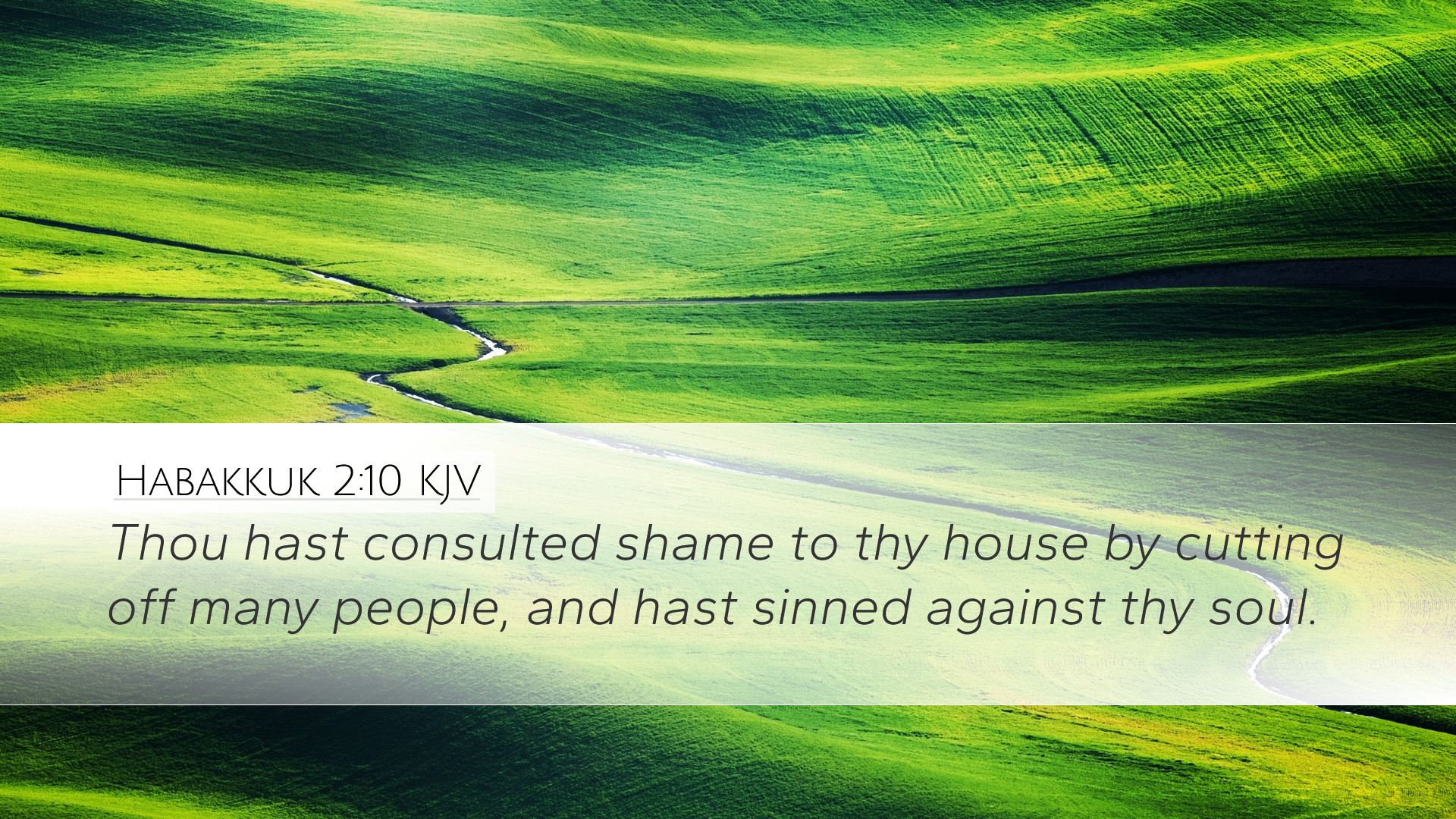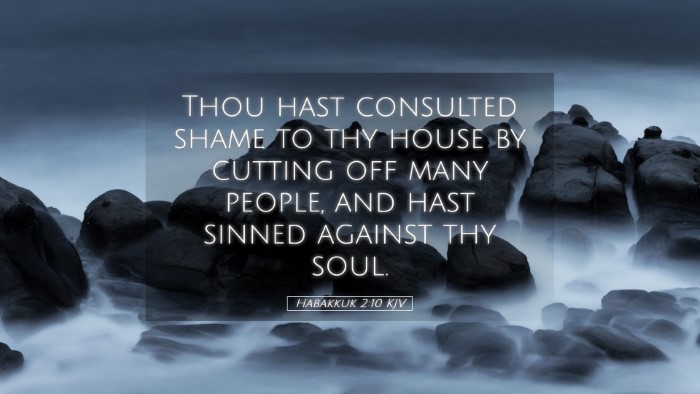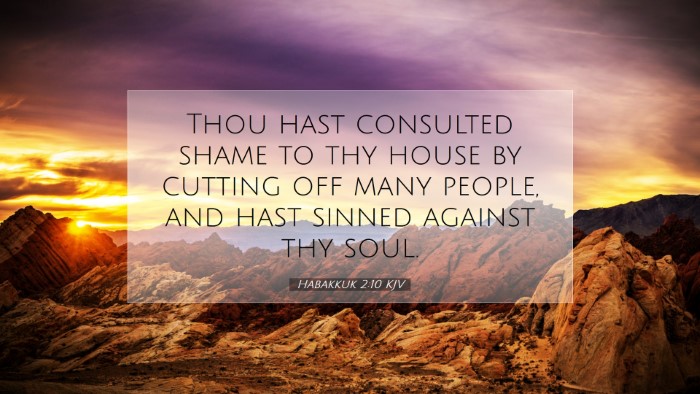Old Testament
Genesis Exodus Leviticus Numbers Deuteronomy Joshua Judges Ruth 1 Samuel 2 Samuel 1 Kings 2 Kings 1 Chronicles 2 Chronicles Ezra Nehemiah Esther Job Psalms Proverbs Ecclesiastes Song of Solomon Isaiah Jeremiah Lamentations Ezekiel Daniel Hosea Joel Amos Obadiah Jonah Micah Nahum Habakkuk Zephaniah Haggai Zechariah MalachiHabakkuk 2:10
Habakkuk 2:10 KJV
Thou hast consulted shame to thy house by cutting off many people, and hast sinned against thy soul.
Habakkuk 2:10 Bible Commentary
Commentary on Habakkuk 2:10
Habakkuk 2:10 reads: "You have devised shame for your house by cutting off many peoples, and have sinned against your own soul."
This verse is a profound indictment of those who engage in unrighteous practices and schemes, showing the inevitable consequences of their actions. The insights from various public domain commentaries will be examined to provide a well-rounded understanding.
Overview of Habakkuk
Habakkuk, a minor prophet, wrestled with the problem of evil and the apparent triumph of injustice. His dialogue with God highlights the tension between divine justice and human folly. Habakkuk 2:10 appears in the context of divine judgment against those who oppress others for their gain.
Analysis of the Verse
In this verse, the prophet addresses how the Chaldeans (Babylonians) have become agents of oppression. The phrase "you have devised shame for your house" symbolizes not only the moral degradation of the oppressors but also points to the futility and dishonor that accompanies their pursuits.
Matthew Henry's Commentary
Matthew Henry observes that this verse speaks to the consequences of seeking gain through violence and deceit. He emphasizes that the oppressors have plotted against individuals and communities, leading to various forms of loss.
- Shame and Infamy: Henry highlights that the plans of the wicked will ultimately lead to shame. What they seek to build will only serve to increase their disgrace.
- Self-destruction: The commentary points out that by harming others, the oppressors bring ruin upon themselves. Their greed and malice are self-destructive in nature.
Albert Barnes' Notes
Albert Barnes provides further insight, explaining that the "cutting off many peoples" refers to the violent strategies employed by the Chaldeans. This serves as a reflection of their character as ruthless conquerors.
- Sowing Discord: Barnes illustrates how the greed for power leads to societal turmoil and disintegration. The oppressors fail to recognize that their actions will not be without repercussions, both now and in eternity.
- Moral Responsibility: This commentary emphasizes that nations and leaders are accountable for their actions. The act of sinning against one’s own soul indicates a deep moral failure.
Adam Clarke's Commentary
Adam Clarke also comments on the spiritual dimensions of this verse. He underscores the idea that when one resorts to injustice, they not only harm others but also gravely endanger their own spiritual wellbeing.
- Divine Justice: Clarke notes that God sees all injustices and that divine retribution is certain. There’s an inextricable connection between human conduct and divine oversight.
- Community Impact: Clarke points out the ripple effects of actions taken against the innocent. The harm caused to communities not only affects them but also invokes the displeasure of God, which can lead to national ruin.
Theological Implications
The verse presents several theological implications that resonate within a pastor's teaching or a student's study:
- The Nature of Sin: The sin described is not merely personal but collective, showing that the impact of one's sin reaches beyond individual consequences.
- Human Responsibility: It challenges individuals to reflect on their actions and the moral implications of their choices.
- Hope in Judgment: The sovereignty of God in judging unrighteousness offers hope. While Habakkuk laments evil, he also anticipates that God will act justly.
Application for Today
For pastors and theologians, Habakkuk 2:10 can serve as a poignant reminder of the importance of justice and righteousness in both personal and communal life:
- Preaching Justice: This verse serves as a call to preach and practice justice within the church and community. It emphasizes a holistic understanding of righteousness that affects all aspects of life.
- Personal Integrity: In the pursuit of goals, individuals must guard against morally compromising actions that can lead to shame and self-destruction.
- Awareness of Consequences: The prophetic message reminds believers to consider the long-term consequences of their actions, both in spiritual and societal terms.
Conclusion
In summary, Habakkuk 2:10 offers a multifaceted exploration of the themes of injustice, consequence, and divine accountability. The insights drawn from Matthew Henry, Albert Barnes, and Adam Clarke provide valuable perspectives that resonate across millennia. This verse challenges believers to reflect deeply on their actions and their effects on both their souls and society at large.


